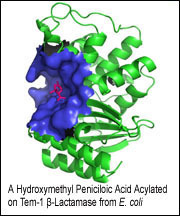
Twenty-one leading researchers from universities and pharmaceuticals around the world will present at a conference titledNovel Antibiotics, Old and New TargetsSaturday and Sunday (June 28 and 29) in the Jordan Hall of Science at the University of Notre Dame.
The conference assembles leaders from Pfizer, Merck, AstraZeneca, Wyeth-Ayerst, the University of Amsterdam, the University of Gent, the University of Ljubljana, Northwestern University and numerous other institutions and pharmaceutical corporations who share an interest in developing antibacterial agents. Presenters will share their work on developments involving highly resistant bacteria, known assuperbugs,for which there are few, if any, treatments.
Nowadays, fewer pharmaceutical companies are involved in the development of drugs for these bacteria, because treatments for other diseases are more profitable. The conference will focus on old targetsthe sites of interaction of existing antibioticsand new targets that could provide opportunities for new classes of drugs to treat infections.
Presenters include Steve Brickner and Michael Barbachyn, the co-inventors of Zyvox, which was introduced in 2000 in U.S. clinics to treat infections from methicillin-resistant Staphylococcus aureus (MRSA), a superbug that still kills about 20,000 people a year in the United States alone. Another notable presenter is Karen Bush from Johnson&Johnson who is spearheading the introduction of Ceftobiprole in the United States. Ceftobiprole, a broad-spectrum antibiotic that also can treat MRSA, was approved this year for treatment of complicated skin infections.
Faculty members in the Departments of Chemistry and Biochemistry as well as Biology will be chairing the sessions. The conference is led by Shahriar Mobashery, professor of chemistry and biochemistry and Navari Family Chair in Life Sciences, who investigates mechanisms of antibiotic resistance in MRSA, among other bacteria, and studies strategies in development of new classes of antibiotics. He says that the importance of this event is underscored by the difficulties that clinicians are having in dealing with highly resistant bacteria. Some of these infective agents can only be treated with a single available antibiotic or cannot be treated with anything that is available.
The entire conference schedule is available at http://science.nd.edu/antibiotics/ .
_ Contact: Shahriar Mobashery, Navari Family Chair in Life Sciences, 574-631-2933 or_ " mobashery@nd.edu ":mailto:mobashery@nd.edu _
_
TopicID: 28448